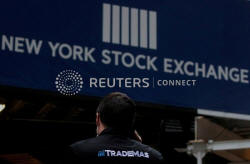|
For
second-quarter earnings, which begin next month, analysts are
expecting a 64% jump over a year ago, the biggest increase for
any quarter since the financial crisis in 2009, according to
IBES data from Refinitiv.
But investors may be difficult to impress after the
first-quarter's blowout results, with many fretting about
inflationary pressure that could push the Federal Reserve toward
raising interest rates.
With inflation worries rising, investors will keep a close eye
on the impact of higher input costs on profit margins.
Hotter-than-expected inflation fears hit the market this week
after the Fed hinted it could tighten monetary policy sooner
that many investors anticipate.
The next earnings season is still weeks away, but there is a
good chance that results will be even stronger than current
estimates, said Jonathan Golub, chief U.S. equity strategist and
head of quantitative research at Credit Suisse Securities in New
York.
"Right now companies are able to pass on all of the higher input
costs to their customers, so profit margins are under no
pressure at all," he said, noting if earnings are likely to
surprise to the upside, price-to-earnings ratios "are likely
overstated."
The S&P 500 is up 11% in 2021, near record highs. Yet the index
is trading at 22 times forward earnings, below the 23.5 times at
the start of the year, according to Refinitiv.
Many companies raised their second-quarter estimates during the
first-quarter profit season, Nick Raich, CEO of the Earnings
Scout, wrote in a note.
"While it is still too early to know for sure, it does appear
that the positive earnings momentum will persist in the 2Q 2021
period" and into the second half of 2021, he wrote.
Next year's outlook is less clear. S&P 500 earnings are
currently projected to increase 36.5% in 2021 and 11.7% in 2022,
according to Refinitiv.
Investors have flocked to areas of stocks that tend to benefit
the most from economic growth since the recovery from the
pandemic began last year, but the issue has become "how
sustainable will growth be," said Eric Freedman, chief
investment officer at U.S. Bank Wealth Management in
Minneapolis.
"There are concerns about what Q1 and Q2 of next year will look
like," he said. "Perhaps that reflation trade has gotten ahead
of itself, and I think that's the message you're seeing from
markets right now."
(Reporting by Caroline Valetkevitch in New York; Editing by
Matthew Lewis)
[© 2021 Thomson Reuters. All rights
reserved.] Copyright 2021 Reuters. All rights reserved. This material may not be published,
broadcast, rewritten or redistributed.
Thompson Reuters is solely responsible for this content.

|
|





